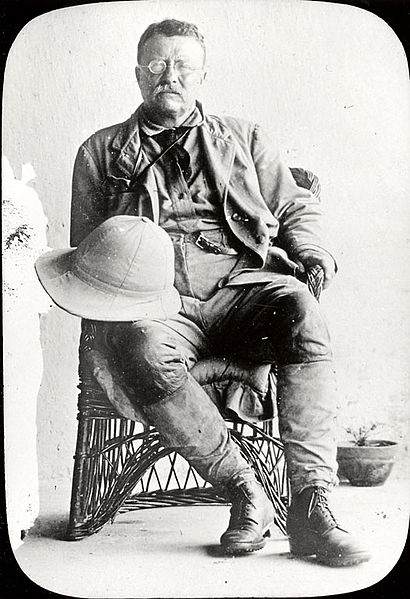It is not the critic who counts, not the man who points out how the strong man stumbles, or where the doer of deeds could have done them better. The credit belongs to the man who is actually in the arena, whose face is marred by dust and sweat and blood; who strives valiantly; who errs, who comes short again and again, because there is no effort without error and shortcoming; but who does actually strive to do the deeds; who knows great enthusiasms, the great devotions; who spends himself in a worthy cause; who at the best knows in the end the triumph of high achievement, and who at the worst, if he fails, at least fails while daring greatly, so that his place shall never be with those cold and timid souls who neither know victory nor defeat.
Theodore "Teddy" Roosevelt,
the 26th President of the United States
(photo above is of Roosevelt dressed in full expedition attire
as he led a 1909 expedition to Africa on behalf of the Smithsonian Institution)

These are true and stirring words, George. Give me dust, sweat and blood every time.
ReplyDeleteI'm with you, Robert. It's never about winning or losing. It's about being in the game, "daring greatly," as old Teddy said.
DeleteAn awesome quote. Balm to anyone reeling from a chastening experience.
ReplyDeleteI agree, Dominic. I think Keats was right about the value of "negative capability," the need of every creative artist to press forward in the face of failure, disappointment, criticism, and other forms of negativity. To paraphrase Roosevelt, art cannot be created without "daring greatly" in the arena of action.
DeleteThis goes well with my post of yesterday George.
ReplyDeleteHaving just returned from a trip, I only had a chance to read your post this morning, and I agree that there is a connection between what Roosevelt says in this quote and what you discuss in your post. Every person and every culture functions is a different arena of challenges, and, consequently, the better course is usually to respect, rather than criticize, how others live, work, and give meaning to their lives.
DeleteWe should keep these statements posted in our minds every day as we encounter the world. I just read a passage in Trollope's Barchester Towers by a vicar who had just listened to another character criticize men of the church for infighting. Now you know my feelings about the church, but I thought his argument was very good. Here's part of it:
ReplyDelete"It is so easy to condemn," said he, continuing the thread of his thoughts. "I know no life that must be so delicious as that of a writer for newspapers, or a leading member of the opposition— to thunder forth accusations against men in power; to show up the worst side of everything that is produced; to pick holes in every coat; to be indignant, sarcastic, jocose, moral, or supercilious; to damn with faint praise, or crush with open calumny! What can be so easy as this when the critic has to be responsible for nothing? You condemn what I do, but put yourself in my position and do the reverse, and then see if I cannot condemn you."
I agree, Ruth, and Roosevelt's observation needs to be remembered especially by those of us who are engaged in the creative life. The sharpest criticisms of art seldom come from other artists who understand the nature and challenges of creativity. They come from non-artists who often know little, if anything, about the form of art that is the subject of their criticism.
DeleteAs I read the Roosevelt quote, I could not help but think of Monet's ground-breaking painting, Impression, Sunrise, 1873, and those artists who became known as the "Impressionists," but who initially called themselves "intransigents" or "independents." These artists were initially ridiculed and satirized, especially by the art critics of the time, yet 19th century impressionist paintings are now among the moest revered paintings in the world. I also think of poor Van Gogh, who never sold a single painting in his lifetime.
Whether they be poets, painters, novelists, or whatever, artists are called upon to be bold and original. Anything less is cheap imitation. I'm with Teddy on this one. I have no desire to be one of those "cold and timid souls who neither know victory nor defeat."
I love that quote. , and it reminds me not to take too seriously the criticisms of those who sit and watch but complain that the volunteer organization my hubby and I run isn't doing everything they would like it to do. Every time I hear "You know what you guys should do?" I go into internal lockdown (so as not to blow up at them) and then respond with "Nice idea, you should do that."
ReplyDeleteThanks so much, Blissed-Out Grandma. Glad you like the quote, and, yes, we should ignore the criticisms that come our way from people whose primary interest in life is judging others. I know what you mean by going into "internal lockdown." I spend a lot of time there myself.
DeleteThe truest of words from a man who lived what he spoke and wrote…a genuine adventurer and outdoorsman who found solace in wild country and kept tryst with the wind. He has it exactly right. Would that I always live my life "daring greatly," and who cares what those with their little buttoned-down minds and lives think or say!
ReplyDeleteThanks, Grizz. Glad these words resonated deeply with you. Few people can say that they live their lives "daring greatly" at every moment, but most of us know through experience that the moments in which we did dare greatly were some of the most rewarding of our lives. As you emphasize, the main thing is to avoid the negative influence of those "buttoned-down minds" who live to criticize rather than create.
Delete